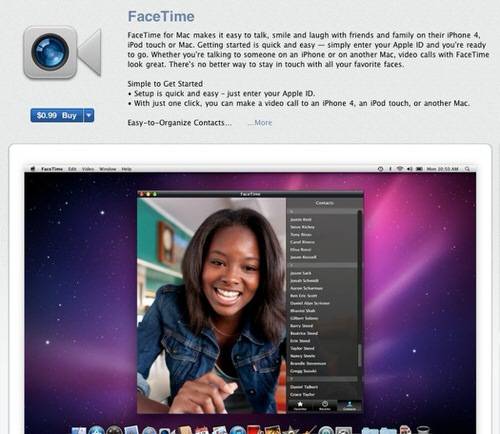Apple has released FaceTime for Mac in its Mac App Store today, allowing any Mac OS X user to chat with friends and family on their iPhone 4 or iPod Touch. The app, which has been in beta testing since October, is now available as a $0.99 download. The price, although affordable, is somewhat surprising considering that FaceTime’s mobile counterpart – a built-in feature in Apple’s mobile handhelds (iPhone 4, and yes, even the iPod Touch) is free.

Is it greedy or is it genius for Apple to sell FaceTime for Mac instead of give it away as a free download? And what does this mean for Apple’s iChat?
Should Apple Charge for FaceTime?
During FaceTime for Mac’s beta period the app was free, which is why so many users were surprised this morning when the new, final version launched with a small price tag attached.
It’s not that $0.99 is a ton of money – most iPhone users think nothing of dropping a dollar for an app these days – but it is a limiting factor as to how many users will download the application. Free “sells” better than paid, at least when the goal is increasing the install base of end users.
This begs the question: is there some reason why Apple wouldn’t want its FaceTime app spread more widely among its Mac users? One has to wonder – especially since Apple has decided to make FaceTime a standalone paid application instead of integrating it into its already widely known and popular Mac app called iChat. It’s odd that Apple would now offer two different video chat programs – one for desktop-to-desktop connections and one for desktop-to-mobile.

FaceTime vs. the Competition
It’s also surprising to see the $0.99 fee considering that Apple’s main competition, Skype, began giving away free video chat with its iPhone application back in December 2010. And Skype’s version works over both Wi-Fi and 3G connections, while FaceTime on mobile is a Wi-Fi-only application.
Other startups in the video chat space are growing quickly, too. Tango, for example, does iPhone and Android video chat sessions with desktop support in the works, and up-and-comer ooVoo does video chat with up to six participants on Mac, PC, Android and soon iOS devices. How does Apple expect to compete with cross-platform competitors whose apps are free?
Maybe Apple doesn’t need to compete with them. Back when FaceTime launched, Apple CEO Steve Jobs did note that Apple intends to make FaceTime’s technology an open platform for video chat applications. He probably didn’t mean “open” as in “open source,” but “open” as in – feel free to integrate our technology into your company’s video chat product. Assuming that’s still the course Apple is following, Tango, Skype, ooVoo and others aren’t necessarily the competition – they’re just another potential customer for FaceTime integration in the future.

















